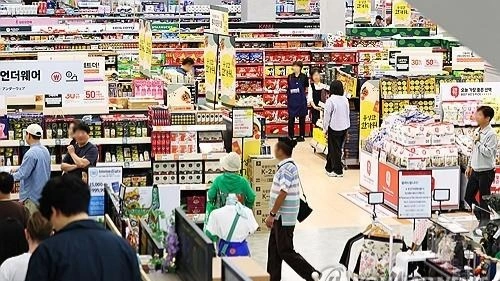S. Korea's GDP expands 1.2 pct in Q3; fastest growth in 6 quarters
The South Korean economy expanded at the fastest pace in 1 1/2 years in the third quarter, supported by solid exports and rising private consumption, central bank data showed Tuesday, Yonhap reports.

Real gross domestic product (GDP), a key gauge of economic growth, rose 1.2 percent in the July-September period from the previous quarter, preliminary data from the Bank of Korea (BOK) showed.
It marked the fastest quarterly expansion since the first quarter of 2024, when the economy grew 1.2 percent, and was up from a 0.7 percent on-quarter increase in the second quarter.
The third-quarter figure also beat the BOK's expectation of a 1.1 percent gain.
On an on-year basis, the economy expanded 1.7 percent in the third quarter, accelerating from a 0.6 percent increase in the previous quarter.
The country's GDP unexpectedly contracted 0.2 percent in the first quarter, as a domestic political crisis sparked by former President Yoon Suk Yeol's martial law declaration, coupled with uncertainties from U.S. President Donald Trump's sweeping tariff measures, weighed on consumer spending and slowed export growth.
But the economy has rebounded on the back of the government stimulus measures and strong exports, particularly in the brisk semiconductor sector.
Rising domestic demand and exports drove the economic expansion in the third quarter.
Private consumption rose 1.3 percent, marking the fastest growth since the third quarter of 2022, while government spending climbed 1.2 percent, the highest since the fourth quarter of 2022.
Exports increased 1.5 percent from the previous quarter, supported by strong global demand for semiconductors and automobiles.
Facilities investment grew 2.4 percent, while construction investment slipped 0.1 percent.
The BOK said that domestic demand and net exports contributed 1.1 percentage points and 0.1 percentage point, respectively, to the third-quarter economic growth.
The rise in private consumption was driven by improved consumer sentiment, government stimulus measures, the launch of new smartphones and electric vehicles and increased medical spending at general hospitals following the return of trainee doctors, BOK official Lee Dong-ton said at a press briefing.
"Despite the impact of U.S. tariffs, exports, particularly semiconductor shipments, have held up relatively well. But it remains to be seen how automobiles and other sectors will be affected by the new tariffs going forward," he added.
The annual growth rate for 2025 could theoretically reach above the BOK's targeted 0.9 percent if fourth-quarter growth comes in at minus 0.1 percent or higher.
The BOK projected Asia's fourth-largest economy to expand 0.9 percent this year and 1.6 percent in 2026, and it is expected to release a revised outlook in November.
Earlier, it was reported South Korea aims to induce 30 trillion won (US$20.8 billion) in corporate investment by 2030 to develop 40 key technologies in the materials, parts and equipment sector, essential in the fields of artificial intelligence (AI) and quantum computing.
